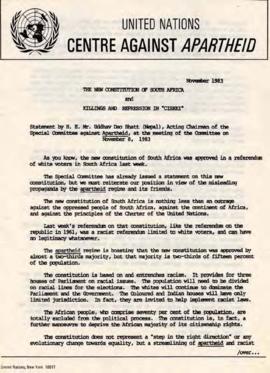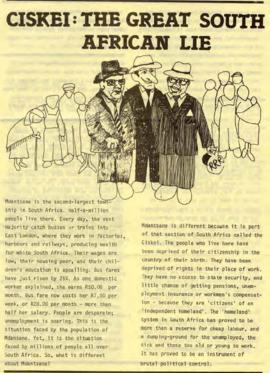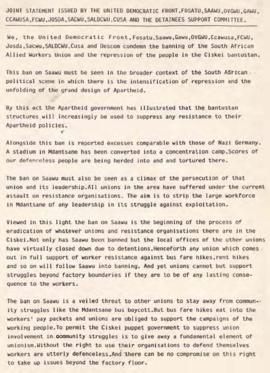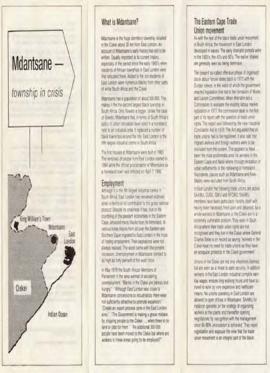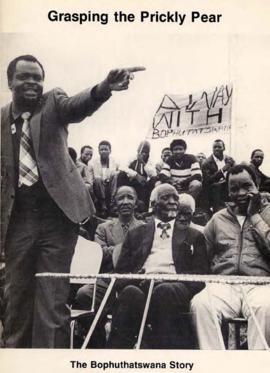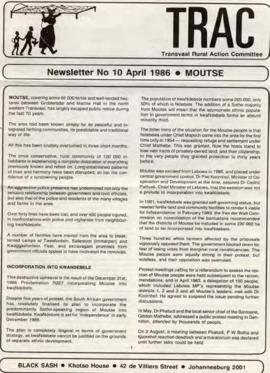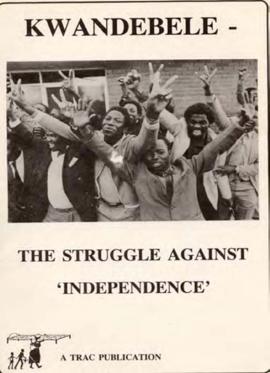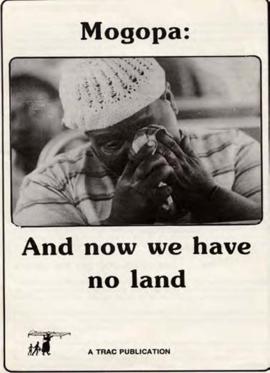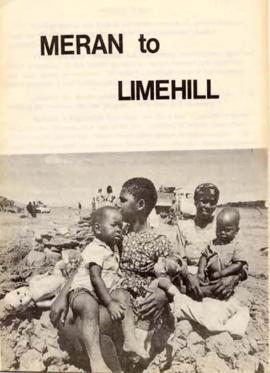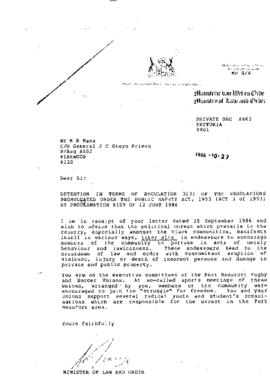Identity area
Reference code
Title
Date(s)
- 1970 - 2002 (Creation)
Level of description
Fonds
Extent and medium
Extent36 linear metersForm of materialAnti-apartheid collection
Context area
Name of creator
Administrative history
The Kairos Foundation (Stichting Kairos) was founded in 1970 as a support group for the Christian Institute in South Africa, whose general secretary was anti-apartheid activist Dr CF Beyers Naude. Kairos, a Greek word, means 'time is running out'. Until 1990 most of Kairos' attention focussed on violations of human rights in South Africa and mobilisation of support in the Netherlands for sanctions and disinvestment.
In the 1970s and 1980s the organisation focused on the causes of apartheid with campaigns aimed at Dutch firms active in the apartheid economy. Other campaigns were aimed at forced removals, detentions, torture in detention, the death sentence, children, conscription and the activities of the security forces
Kairos' work was supported by many of the Dutch churches and there was co-operation from church circles in Southern Africa. Extensive contacts were made with black South African clerics studying in the Netherlands. Kairos mobilised attention on the disempowered and influenced public opinion through campaigns and publications
Through Kairos, many South African organisations channelled information to international organisations and the media. From 1996-1997, Kairos researched the assault and torture of political prisoners in the 1960s and 1970s for the Truth and Reconciliation Commission.
After 1990 attention shifted to the consequences of apartheid and support for the reconstruction of the country. Youth development was given considerable attention with training, conferences, support and specialist input from experts in various fields to organisations involved in the development of the youth.
In 2002, the Kairos Foundation closed its doors. Its resource and research material was then donated to the University of the Witwatersrand.
Archival history
Immediate source of acquisition or transfer
Content and structure area
Scope and content
The collection material covers the years 1970 to 2002. Much of the material consists of copies with some exceptions. In co-operation with a large number of non-governmental organisations involved in human rights issues an extensive collection of reports, publications, pamphlets, telegrams and telexes, newsletters and letters was collected.
Later material, particularly in the Truth and Reconciliation Commission section was added from Internet news services and the TRC web site. There are a few letters from and to Kairos, but the bulk of the collection is Kairos' research and resource material. Kairos also developed a database and researched reports on detention, torture and deaths in detention for the Truth and Reconciliation Commission. Kairos research reports and publications are to be found in most of the sections.
Kairos has also donated audio-visual tapes of the Truth and Reconciliation Commission hearings. A list of these is available at Historical Papers. A small collection of ephemera consists of campaign buttons, stickers and postcards. A collection of posters contains campaign posters and a series of exhibition posters. Books donated by Kairos have been added to the Africana Library.
Appraisal, destruction and scheduling
Accruals
System of arrangement
The material has been placed under the headings and generally in the order in which it was received. The item level description seldom provides detailed lists of all items, but is a sample of the material. There are eleven series. Within these, subject headings facilitate researcher access. The subject headings originate from the Kairos lists and file indexes where provided. The newspaper clippings are extensive. These have been ordered within subject headings and ordered by year.
Conditions of access and use area
Conditions governing access
Affidavits and sworn statements that have not been made public are only available with the permission of the person/s concerned. The affidavits in the Namibia section may not be used until 2010.
Conditions governing reproduction
Copyright Historical Papers Research Archive, The Library, University of the Witwatersrand, Johannesburg, South Africa
Language of material
Script of material
Language and script notes
Physical characteristics and technical requirements
Finding aids
Allied materials area
Existence and location of originals
Existence and location of copies
Related units of description
Notes area
Note
The archival arrangement, description and encoding of the Kairos Collection were funded through a generous grant from the Royal Netherlands Embassy
Note
Preferred citation: [Identification of Item], The Kairos Collection, Historical Papers, University of the Witwatersrand, Johannesburg.
Alternative identifier(s)
Access points
Subject access points
Place access points
Name access points
Genre access points
Description control area
Description identifier
Institution identifier
Rules and/or conventions used
Status
Level of detail
Dates of creation revision deletion
Language(s)
Script(s)
Sources
Archivist's note
Collection arranged and described by Deborah Wilson, Jean Beater and Annoula Seldon, 2003


